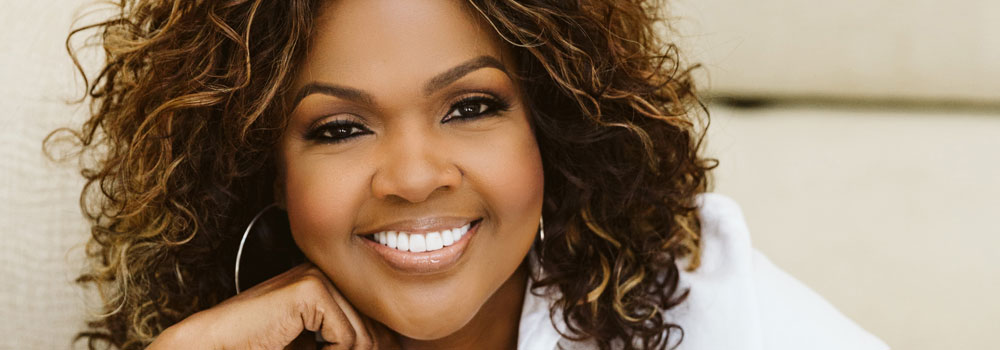
by Shari Noland | Sep 15, 2021 | Entertainment |
CeCe Winans released a new album in March called “Believe For It,” and she debuted a few songs at her first live, virtual special called “An Evening of Thanksgiving,” which aired in February.
Compassion International, a Christian ministry aimed at finding sponsors for children worldwide, has partnered with Winans for the event. She’s also a strong supporter of their work and has sponsored a few children herself. It’s a fitting partnership, given new songs are meant to encourage people, and that’s how she sees the work of Compassion.
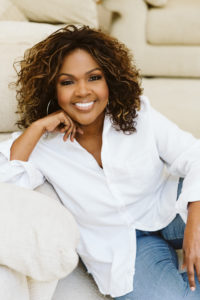
CeCe Winans
“I get excited about partnering with organizations that are doing something that brings life, and Compassionate International does that. They make a difference, and they put a smile on kids’ faces who otherwise wouldn’t have hope. They bring hope,” says Winans. “They bring peace, food, water, clothing, and education. They give them something that will enhance their life, not just for a moment.”
I had an opportunity to chat with CeCe about her new songs, the virtual event, and her son taking on a new leadership role in their church.
You’ve had so much music success. Can you share what’s unique in the new music that’s coming out? What can fans look forward to?
It’s my first live record, and it’s music that encourages you to sing along. I think that’s something that people can look forward to. I’m doing a lot of songs that maybe you’ve heard before, maybe not, but I know that a lot of people have sung them in their churches. I wanted to create something that people and churches and everybody could sing along with. So it’s definitely a CD that’s filled with praise and celebration. Everybody needs some hope right now.
Tell us about the creative process during the making of your new album.
I’ve always determined songs by how they’ve ministered to me. I believe that if it hits my heart, it’s going to hit other people’s hearts. But the title of the record is called “Believe For It.” And this was the last song that came in when we decided we had all of our songs, but we felt something was missing. We really liked it [the album], but it seemed like we needed something else with the theme or something that will kind of, I don’t know, just put us in the frame of mind that we need to be in.
And my producers, Kyle Lee and Dwan Hill, got together, and they started writing with another young man, and they came back, and they played one song for me, and it was a good song. And I was like, that’s good, but that’s not it. And we kept going because, again, we had a strong record already, but we all kind of agreed that we needed something else. Another part of the puzzle was missing. And then they came with the song, Believe For It. And when I heard it — that’s it! That’s it! We all agreed, and I even did some writing on it to finish it up. But it is just the message of hope that everyone needs to hear. It doesn’t matter who you are, where you come from. You need to brush yourself off, brush those dreams off and start to believe again.
You’re so passionate about the work of Compassion International. Have you ever sponsored a child?
I’ve been sponsoring kids for years. And you go into this thinking you’re going to be a blessing to them, and you WILL be a blessing to them, but it ends up coming back to your life in so many ways. I know my kids are blessed.
Giving blesses your life. When I went to visit some of these kids years ago, and I saw the level of poverty that they lived in, first of all, my heart was just broken. I mean, they walk miles and miles for dirty water, contaminated water. I’m talking 10 miles.
And then you see where they live. And the first thing you realize is, “What am I complaining about? Why do I have to complain about anything?” They had this joy on their faces. And so when I came home years ago, I told my kids, “Oh no, no, no. We are going to live our lives differently.” And they were probably looking at me like, “Mom, what are you talking about?” You have to live a whole different way. Because of that, I know I’ve been blessed. I get excited about compassionlive.com. I pray that everybody will tune in, but not just tuning in, go and sponsor a child because even coming out of 2020, people who are brokenhearted, people who have lost their job, people who need major blessings in their lives, I’m telling you the way to break through is to give.
I understand your son is taking on more of a leadership role in your church, Nashville Life Church in Nashville, TN. What does that mean to you personally and to your family?
My husband and I started this church eight years ago, and it was birthed really through my son and his friends. When we started, it was all millennials, and our church is filled with millennials. And then my husband and I looked at each other and said, “Really, God? You want us to pastor?” We’re like, “Okay, here we go.” But my son started with all of his friends, and God just did work in my son’s heart. And he started witnessing and getting people to feel with the Holy Spirit. Leading people, should I say, to be filled with the Holy Spirit.
It started in my home with 35 people. And the Lord told my husband when we started eight years ago that my son would pastor. So we were the founding pastors, and my son has been pastoring along with us all of these years. The transition that we made three weeks ago is him being lead pastor, and now we’re the founding pastors. It’s just exciting because even within those three weeks, it’s like growth is happening the way he’s anointed to do it. And my husband and I looked at each other and said, “Wow, thank God. We at least carried it for eight years.” We didn’t make it work. We knew that we were in the will of God doing what we did, but we knew it was always about him and this generation.
It’s not like we’re retiring, but we are definitely in the background encouraging, pushing him, and just covering him. It’s exciting to see and not only him, but all the young people, our staff, are taking it over, and they’re the Joshua generation. It’s time.
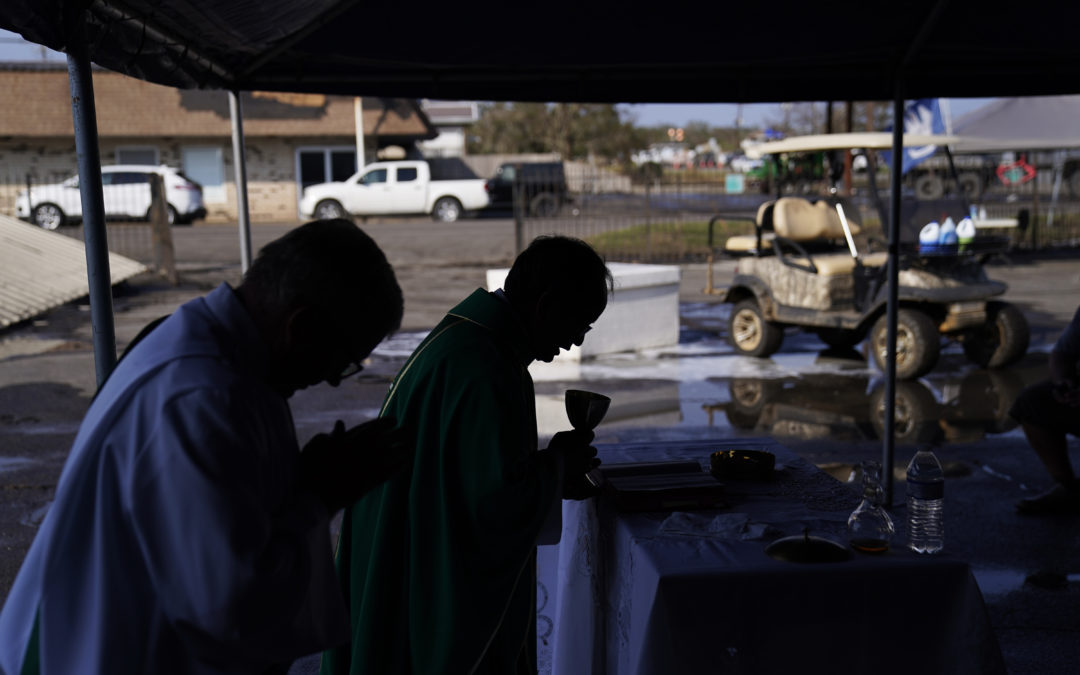
by Matt Sedensky and Aaron Morrison, Associated Press | Sep 14, 2021 | Headline News |
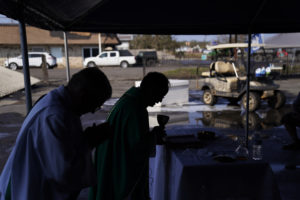
The Rev. Luke Nguyen, right, celebrates Mass in a flood damaged parking lot in the aftermath of Hurricane Ida, Sunday, Sept. 5, 2021, in Jean Lafitte, La. The service was held in a parking lot after St. Anthony Catholic Church was flooded in the hurricane. (AP Photo/John Locher)
MARRERO, La. (AP) — Amid the devastation caused by Hurricane Ida, there was at least one bright light Sunday: Parishioners found that electricity had been restored to their church outside of New Orleans, a small improvement as residents of Louisiana struggle to regain some aspects of normal life.
In Jefferson Parish, the Rev. G. Amaldoss expected to celebrate Mass at St. Joachim Catholic Church in the parking lot, which was dotted with downed limbs. But when he swung open the doors of the church early Sunday, the sanctuary was bathed in light. That made an indoor service possible.
“Divine intervention,” Amaldoss said, pressing his hands together and looking toward the sky.
A week after Hurricane Ida struck, many in Louisiana continue to face food, water and gas shortages as well as power outages while battling heat and humidity. The storm was blamed for at least 17 deaths in Louisiana, Mississippi and Alabama.
On Sunday, state health officials announced that the death toll in Louisiana has climbed to 13, including a 74-year-old man who died of heat during an extensive power outage. In the Northeast, Ida’s remnants dumped record-breaking rain and killed at least 50 people from Virginia to Connecticut.
As Mass began Sunday, Amaldoss walked down the aisle of the church in his green robe, with just eight people spread among the pews. Instead, the seats brimmed with boxes of donated toothpaste, shampoo and canned vegetables.
“For all the people whose lives are saved and all the people whose lives are lost, we pray for them,” he said. “Remember the brothers and sisters driven by the wind and the water.”
Through the wall of windows behind the altar, beyond the swamp abutting the church, the floodgates that saved the building could be seen. The Gospel was the story of Jesus bringing sight to a blind man, and throughout the tiny church, stories of miracles were repeated.
Wynonia Lazaro gave thanks for newly restored power in her home, where the only casualties of Ida were some downed trees and loosened shingles.
“We are extremely blessed,” she said.
Some parishioners suffered total losses of their homes, or devastating damage. Gina Caulfield, a 64-year-old retired teacher, has been hopping from relative to relative after her cousin’s trailer, where she’d been living, was left uninhabitable. Still, she was grateful to have survived the storm.
“It’s a comfort to know we have people praying for us,” she said.
Some parishes outside New Orleans were battered for hours by winds of 100 mph (160 kph) or more, and Ida damaged or destroyed more than 22,000 power poles, more than hurricanes Katrina, Zeta and Delta combined.
More than 630,000 homes and businesses remained without power Sunday across southeast Louisiana, according to the state Public Service Commission. At the peak, 902,000 customers had lost power.
Fully restoring electricity to some places in the state’s southeast could take until the end of the month, according Phillip May, president and CEO of Entergy, which provides power to New Orleans and other areas in the storm’s path.
Entergy is in the process of acquiring air boats and other equipment needed to get power crews into swampy and marshy regions. May said many grocery stores, pharmacies and other businesses are a high priority.
“We will continue to work until every last light is on,” he said during a briefing Sunday.
In Jean Lafitte, a small town of about 2,000 people, pools of water along the roadway were receding and some of the thick mud left behind was beginning to dry.
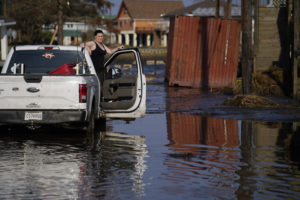
Shannon Lation checks on her home destroyed by Hurricane Ida, Sunday, Sept. 5, 2021, in Lafitte, La. (AP Photo/John Locher)
At St. Anthony Church, the 4 feet (about 1.2 meters) of water once inside had seeped away, but a slippery layer of muck remained. Outside, the faithful sat on folding metal chairs under a blue tent to celebrate Mass. Next door, at the Piggly Wiggly, military police in fatigues stood guard.
“In times such like these, we come together and we help one another,” the Rev. Luke Nguyen, the church’s pastor, told a few dozen congregants.
Ronny Dufrene, a 39-year-old oil field worker from Lafayette, returned to his hometown to help.
“People are taking pictures of where their houses used to be,” he said. “But this is a chance to get together and praise God for what we do have, and that’s each other.”
In New Orleans, many churches remained closed due to lingering power outages.
But First Grace United Methodist Church opened its doors and held service without power. Sunlight from large windows brightened the sanctuary, where about 10 people sat.
“Whatever situation you’re in, you get to choose how you see it,” said Pastor Shawn Anglim, whose first time pastoring the congregation was after the church recovered from Hurricane Katrina 16 years ago. “You can see it from a place of faith, a place of hope and a place of love, and a place of possibility.”
Jennifer Moss, who attended service with her husband, Tom, said power had been restored to their home on Saturday.
“We’ve been blessed throughout this entire ordeal,” she said. “That storm could have been a little closer to the east, and we wouldn’t have a place to come and worship.”
In Lafitte, about 28 miles (45 kilometers) south of New Orleans, animal control officer Koby Bellanger experienced his own little blessing after he heard the sounds of an animal crying as he rode through the flooded streets with a sheriff’s deputy.
Bellanger waded through the water and found a tiny, green-eyed black kitten clinging to the engine of a car outside a devastated house. He hoisted the animal up, to the delight of Lafayette Parish Deputy Rebecca Bobzin.
“Bring him!” Bobzin screamed in delight.
Louisiana’s 13 storm-related deaths included five nursing home residents evacuated ahead of the hurricane along with hundreds of other seniors to a warehouse in Louisiana, where health officials said conditions became unsafe. On Saturday, State Health Officer Dr. Joseph Kanter ordered the immediate closure of the seven nursing facilities that sent residents to the warehouse.
Edwards was briefed Sunday about a cluster of thunderstorms near Mexico’s Yucatan Peninsula, but said forecasters “don’t see much potential at all for it developing into a storm of any real significance and we’re very, very thankful for that.”
He said it does have the potential to bring some rain to coastal Louisiana and southeast Louisiana.
___
Morrison reported from New Orleans. Associated Press writer Denise Lavoie in Richmond, Virginia, contributed.
by Harold Arnold | Sep 13, 2021 | Headline News, Relationships |
Video Courtesy of Alicia Renee Greer
When should you start having sex? I was reading through a question posed by a 16-year-old young lady. Here is what she asked this online community of relative strangers, “My friend is wondering what other people think. She is 16 and so am I. I think that it’s fine around the age of 16 if you use protection. She thinks that it’s fine whenever.”
She titled her post “What age should you start having sex?”
I have a 16-year-old daughter myself and imagined that these people were responding to my daughter. That was pretty disturbing to me from the young lady who says she started at 13 and has loved it ever since to another 16-year-old who confirmed that yes 16 is indeed the perfect age.
While there were a few cautionary responses to this young lady, I began to wonder to myself what would I tell this young lady myself. In fact, I personalized it more. What would I tell both my 16-year-old daughter and my 22-year-old son?
Rather than giving them a specific age or situation (e.g., “when you find the right person”), I would tell them why I remained a virgin until I got married. Yes, despite biological urges, social pressures, and even some “close calls” on my wedding night at the age of 22 I had my first sexual experience. I’m proud of that.
Now, don’t get me wrong, I mentioned some “close calls.” I wasn’t an angel. Honestly, there were some heavy petting episodes that I am not particularly proud of. But, there was something in my mind that would not allow me to “go all the way” to consummate the deal. Based on my religious convictions, I just didn’t think I could live with myself if I just let go.
Why did I wait? Some might call it fear. Others might say avoiding shame or guilt. I’m sure all of these are true at some level. But, looking back, I really do think God was protecting me in some ways. I didn’t want God or my family to be disappointed in me. I didn’t want to give away something that I could never undo. That is about as sophisticated as my thinking was during those years.
Now with many more years of experiences and knowledge, I can better articulate (even making a Top 10 list) why I am so glad that I was a virgin when I married. And, most of these same reasons explain why I have stayed and expect to remain faithful to my wife alone.
This article isn’t intended to call out or guilt anyone who chose to be sexual before marriage. Whether you are glad you did or regret it, it is done. You aren’t defined by it either way.
But, I do hope this is a salute and source of encouragement to others like me who choose to wait. I also pray that it will encourage those like my children and others like the 16-year-old posing the question when to start having sex to think carefully.
Top 10 Reasons I’m Glad that I was a Virgin When I Married
Reason #10: I can write this blog post
Well, its true. I could never write this blog post if I wasn’t a virgin when I married. But, there is a bigger point about the ability
to be a living example of what is possible even when culture runs counter to it.
I want to be able to deliver my message without any sense of hypocrisy. I want to be a model for like-minded others. Sometimes, people just need to know what’s possible. How many times have you seen someone achieve some milestone and said to yourself “If they can do it, I can do it.”
If you desire to save your full physical, emotional, and psychological expression to share in a covenantal relationship then my message to you is that it can be done. If you’re a teen with high school pressures, I remember those days of feeling left out and lonely. If you’re a single adult, I remember the awkwardness of some dating relationships during my college years.
I’m proud to represent and give voice to my value of premarital abstinence.
Reason #9: I know exactly how many kids I’ve fathered
There has been much attention, especially in urban centers, about the issue of fatherlessness. There are far too many socioeconomic variables impacting this highly publicized area for me to address here.
Suffice it to say that every man involved in creating a child is responsible for being a father to that child. Being a father is more than some vain conquest or bragging rights. Fatherhood is a lifetime commitment to sacrifice and develop your young. If you are not consistently engaged, you’re not a father. You’re a sperm donor.
The reality, however, is that many men don’t even know kids that they have fathered. Granted, there are clearly situations where this is intentionally withheld from him. But, there are far too many situations where either the mom isn’t sure of paternity herself because of being involved with multiple partners or the man has literally or figuratively disappeared without a trace.
Personally, I know that I have fathered two children. I have and will continue to sacrifice for my kids. They and their mother know my lifetime commitment to them.
Reason #8: Never worry about sexually transmitted diseases (STDs)
Given that neither I nor my wife had any sexual partners outside of our marriage, I have literally never in my life worried for one second about contracting a sexually-transmitted disease.
While some suggest that “safe sex” is the answer, most objective people acknowledge that the only safe sex is no sex if you are thinking of STDs and pregnancy. I just think in my own marriage of those times when we were using condoms in our own family planning efforts. We had so many mishaps even in our carefully “controlled” setting. When these mishaps occur, think of the psychological angst and physical exposure you feel until a test validates that everything is fine.
In 2012, the Centers for Disease Control (CDC) reports nearly 1.5 million cases of chlamydia, nearly 335,000 cases of gonorrhea, and more than 15,000 cases of syphilis (each representing an increase over 2011 figures). And, this isn’t even dealing with chronic diseases like HIV. You can access the report here. And, as you might guess the CDC confirms that the greatest increase in these diseases is among young people ages 15-24—with young women facing the greatest long-term health risk.
I am so grateful that I never have to carry this psychological burden.
Reason #7: I have never coerced or encouraged a woman to have sex for which she wasn’t ready
Physical intimacy is done best among mature people. But, so often it isn’t—resulting in many (especially women) with regrets about giving themselves sexually when they really weren’t ready to do so.
I suspect I would have felt guilty for a long time if I ever fostered such regret.
Reason #6: Proof that it can be done
Nobody can tell me that it can’t be done. I’ve spoken with quite a few males over the years trying to convince me that it is not realistic to expect a guy to remain celibate for so many years.
That’s bull. I’ve done it. And, so can you.
And, if you’re a parent wondering if it is realistic to have this expectation for your child. Yes, have the expectation. And, voice that expectation to them. They can do it with the right encouragement. But, if they choose not to, you have done your part to offer guidance. But, be sure to continue your efforts to engage and guide them even if they don’t make the choices that you prefer.
Reason #5: Sense of pride in being obedient to my religious convictions
Much of my thinking about premarital sex is rooted in my Christian faith tradition. These convictions have been instilled in me since I was a young boy. Granted, I wasn’t given any tools or systematic education to help me live out these convictions. But, clearly, I believed that God desired me to wait until I was married to have sex.
Now, I realize that there are many Christians who choose sexuality outside of the marital context. And, that is between you and God.
But, I also know many Christians who carry around a sense of guilt that their behavior is not aligned with their convictions. They feel like hypocrites. Many of them decide to leave the faith to avoid the cognitive dissonance that they experience. Others just live with a residual sense of guilt.
At least in this area, I feel a sense of pride that there is an alignment between my faith and my behavior. I talk boldly because I don’t worry about any hypocrisy. There is no guilt or proverbial “skeletons in my closet” that I worry about.
Reason #4: Give the gift of celibacy to my wife
Though I can’t say I was mature enough to appreciate this when I got married, in retrospect, I am grateful I could give this gift of celibacy to my wife—especially because she was a virgin herself.
Though possibly less than in the past, there continues to be a double standard for men and women. Men are not typically stigmatized by their sexual conquests while promiscuous women are often cast in a negative light.
It means a lot to me that my wife was a virgin when we married. She saved herself as a gift to the man she would marry. And, I am honored that I could give the same thing back to her.
Of course, this doesn’t mean that your marriage is any less special if you came into the relationship with sexual experience. For you, the key is to give the gift of monogamy to one another. That too is something to be quite proud about.
Reason #3: Debunk the notion that guys only want “one thing”
Men have a reputation (often justifiably so) that when we are in a relationship that we ultimately only have one thing on our mind. All of the flowers, the candy, the dinners, and the engaging conversation are ultimately about coaxing the young lady to the bedroom.
Given that I did not pursue sexual intercourse in any of my dating relationships, I am proof that not all guys are only interested in sex. I wanted companionship. I wanted to have fun together. I wanted intellectual stimulation. I wanted closeness. But, I expected sex to only happen after matrimony.
Yes, there are some guys who are focused on sexual conquest or self-centeredness to getting their own biological urges satisfied. But, there are many guys like I was with a much broader view.
By the way, this is a big issue even after you get married. We husbands have to avoid the trap of coming across as only wanting sex from our wives. We need to give spiritual, emotional, and physical intimacy to have a thriving marriage.
Reason #2: My wife is my only frame of reference
I have had sex with one woman in my life. And, I enjoy it.
Because I’ve never had any better or worse partner, I have no point of comparison. There are no memories of prior enjoyable experiences that might leave me disappointed in any aspect of our physical intimacy.
Sure, we have our sexual miscues as does every long-term relationship. And, yes, I’m sure even after more than 25 years that we still have plenty to learn about maximizing our physical intimacy.
But, I am so grateful that I can never compare my current experience with anything I’ve ever experienced before.
Reason #1: I can encourage my kids to do as I did
And, my number one reason that I’m glad that I waited is what I want to express to my kids.
I will never have to say “do as I say, not as I do”. My wife and I have had conversations with them over the years about our expectation that they commit themselves to waiting until marriage to have sex. We can speak with authority.
Of course, I have no idea if they will heed our advice and prayer. But, they will always know in spite of what the culture presents to them that their parents did it. In this area as in many others, we want to model our values and our faith to our children and future generations of the Arnold family.
As I said at the outset, my intent is not to judge anyone else’s sexual behavior. It is simply to reflect on my own gratitude and model for those with like values.
I’d love to hear your thoughts for and against what I’ve suggested here.
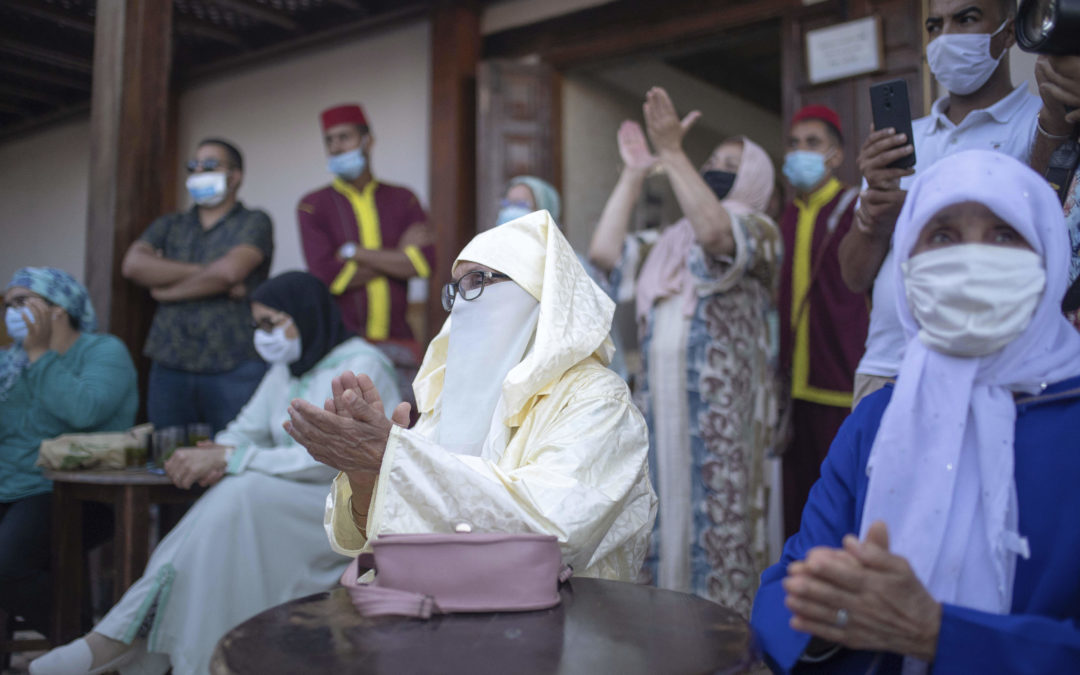
by Allen Reynolds, UrbanFaith Editor | Sep 10, 2021 | Headline News |
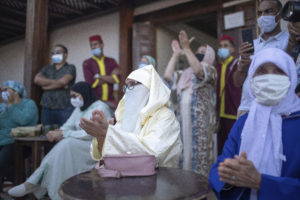
People attend a political rally for Aziz Akhannouch, Moroccan businessman and head of the RNI party, in Rabat, Morocco, Thursday, Sept. 2, 2021, days before the upcoming legislative and regional elections. Millions of Moroccans head to the polls on Sept. 8 to cast ballots in pivotal legislative and regional elections amid strict safety guidelines as the north African country is grappling with a new wave of COVID-19, driven mainly by the Delta variant. (AP Photo/Mosa’ab Elshamy)
RABAT, Morocco (AP) — Moroccans voted Wednesday for a new parliament and local leaders in elections that have been reshaped by the pandemic, and whose outcome is hard to predict as opinion polls were not allowed.
Candidates promised to create jobs and boost Morocco’s economy, education and health care. The kingdom has been hit hard by the pandemic, but has Africa’s highest vaccination rate so far.
Despite a dip in popularity in recent years, the governing Islamist party is eyeing a third term at the helm of the government if it again wins the most parliament seats. But a recent election reform could limits its powers, and the role of lawmakers is limited by the powers of King Mohamed VI, who oversees strategic decision-making.
“I hope that the people we voted for do not disappoint us,” said voter Adel Khanoussi, casting his ballot in the capital Rabat. “There are so many projects that should be implemented. The people’s expectations are high.”
Turnout was 36% three hours before polls closed.
The outcome of Wednesday’s voting is difficult to predict since opinion polls on elections are banned. The race will likely be close and no matter which party comes first, it will likely need to cobble together a coalition with other parties to form the government.
At a school turned polling station in Temara, near the capital, dozens of people stopped in to vote before going to work. Two security officers were stationed outside, and a poll worker took voters’ temperatures before letting them in.
Once inside, voters are asked to provide their identity cards and hand over their phones before entering the booth. They’re required to use hand sanitizer, wear a mask and keep 1-meter (3-foot) distances.
A 36-year-old woman who only gave her name as Fatima said she hopes the parliament can bring a “new Morocco” seen as an advanced world country.
While Morocco has one of the region’s strongest economies and a thriving business district in Casablanca, poverty and unemployment are also widespread, especially in rural regions. Morocco has seen thousands of despairing youth make risky, often deadly, trips in small boats to Spain’s Canary Islands or to the Spanish mainland via the Strait of Gibraltar.
Strict pandemic guidelines restricted candidates’ ability to reach the 18 million eligible voters. Candidates weren’t allowed to distribute leaflets and had to limit campaign gatherings to a maximum of 25 people. As a result, many stepped up efforts on social media instead.
Morocco has registered more than 13,000 COVID-19-related deaths since the start of the pandemic, according to figures from the Moroccan Health Ministry.
There were 31 parties and coalitions competing for the 395 seats in the lower house of parliament. Voters will also be selecting representatives for 678 seats in regional councils.
The moderate Islamist Justice and Development Party (PJD), at the helm of the government since 2011, is seeking a third term. With Prime Minister Saad-Eddine El Othmani, the party has campaigned on raising the competitiveness of Morocco’s economy.
El Othmani acknowledged that turnout is a “challenge” in a country where many are disillusioned with politics, but said he was encouraged at his voting station to see “good participation of voters of both sexes.”
Other major contenders are the center-left Party of Authenticity and Modernity, or PAM, the Istiqlal party and the liberal National Rally of Independents.
Istiqlal general secretary Nizar Baraka said the new parliament should “work for the people to get them out of poverty and stop the deterioration of the middle class.”
The elections were monitored by 4,600 local observers and 100 more from abroad.
by T-Kea Blackman | Sep 9, 2021 | Headline News |
Video Courtesy of AJ+
“Black people don’t commit suicide. That’s a white thing.”
Who said that? That is a false statement. Blacks suffer from mental illness just like their white counterparts. In fact, when you think of everyday stressors, systematic-racism such as police brutality, education and health care gaps, and sexism that impacts black women, blacks are more likely to be at risk for developing a mental condition.
Although July is Minority Mental Health Awareness Month, this week, September 5-11 is National Suicide Prevention Week and it is a perfect time to shed light on what many deem a nonexistent problem. Schizophrenia, post-traumatic stress disorder, bipolar disorder, major depression, generalized anxiety disorder, dissociative identity disorder/multiple personality disorder, bulimia, ADHD, OCD and social anxiety are examples of mental illnesses that people battle daily. In the black community, many choose not to acknowledge mental illness as a sickness. Diseases such as diabetes and cancer are accepted as normal and natural, but what so many fail to realize is that blacks are no different than any other race when it comes to these illnesses. We are not exempt from mental illness.
While some experience mental illness only once in their life (depending on the illness, environment, life stressors, and genetics), others battle mental illness for the rest of their lives. Some of us think that we do not have a problem and truly believe that everyone else is the issue. Unfortunately, these myths and illusions force us to suffer in silence and not seek treatment. Mental illness affects “everyday functional” people and it is not limited to the homeless man talking to himself. It impacts a person’s emotions, perception, and behaviors.
As a person with major depression and generalized anxiety disorders, the comments said to me have been heartbreaking and mind-blowing because it prevented me from seeking help. I thought that I was making it up in my head even though I didn’t feel well for years. Finally diagnosed at 25, my doctor stated that the illness started around the age of 13. Can you imagine having cancer without being diagnosed for over 10 years? You would die. Well, I can tell you that I was dying on the inside and it led to multiple suicide attempts. My illness can get so debilitating. At one point, it stopped me from doing basic things such as going to work, talking, eating and showering.
Here are some of the myths that we must stop saying!
Myth #1: Only white people commit suicide.
Fact: According to by the Centers for Disease Control and Prevention, the suicide rate of black children in between the ages of 5 and 11 doubled between 1993 and 2013 and the rate among white children committing suicide declined. Suicides by hanging nearly tripled among black boys. While whites still have highest suicide rates in the country, suicide rates among black youth have significantly grown over the past decade. Unfortunately, black youth are killing themselves more frequently than their elders. Suicide has become the third leading cause of death among black people between the ages of 15 and 24 and a leading cause of death among school-aged children younger than 12 years in the United States.
Myth #2: Medication doesn’t work and/or they make you feel worse.
Fact: Medication is necessary for some individuals in their mental recovery. While they are NOT cures for mental illness, they are vital for treating the symptoms. Some may need medication for the rest of their lives (depending on the illness) and others only need it for a specific time. Nonetheless, medication is not a sign of weakness and it does not mean the person is crazy. It is no different from taking medication for high blood pressure or insulin for diabetes. Just like the body gets sick, the brain gets sick too, if you don’t take care of it. And no, this is not to say that everyone with a mental illness will need medication, but it is an invaluable help to many.
Myth #3: Black people don’t go to therapy.
Fact: Though there has been a deep-rooted stigma about seeking therapy, Blacks are increasingly seeking therapy for mental illness. Therapy is great whether you have a mental illness or not. Therapy helps you to work on yourself, dissect problems, face fears and overcome obstacles such as breakups, loss of a loved one, financial challenges, self-image issues, abuse, etc. As mentioned previously, blacks deal with oppression daily and therapy can help us work through it. Those who are still hesitant to try therapy can look into other ways of getting help. The support of a life coach has also been shown to be beneficial for many.
Myth #4: You can pray it away.
Fact: As a Christian, I have seen God perform miracles in my life. But when you say to a person “just pray,” you are assuming that they are not praying and dismissing how they feel, challenging the sincerity of their faith, and most likely preventing them from getting treatment. You would not say “just pray” to a person who broke a leg. You would tell them to go to the doctor for an x-ray and cast. We must treat mental illness the same. God also gives us resources to use on earth and sometimes that may be therapy and medication when a person is battling a mental illness.
Damian Waters is a marriage and family therapist in Upper Marlboro, MD, where he serves predominantly African American clients. On the issue of the stigma surrounding blacks seeking therapy, he says, “There’s some shame and embarrassment. You’ll tell someone that you went to the doctor, but you won’t tell that you went to the counselor or psychiatrist. Also, there is the idea that their faith should carry them through, though often their problems are larger than that.”
As a way to honor those with mental illness, please think before you speak, and encourage those who need help to seek treatment. Mental illness is just as serious as any other disease and those affected by it should not be judged or outcast. Mental illness is a flaw in brain chemistry, not a character flaw, or a white people problem.
Can you think of other myths surrounding Blacks and mental illness? Share them below along with your thoughts on putting the myths to rest once and for all.







